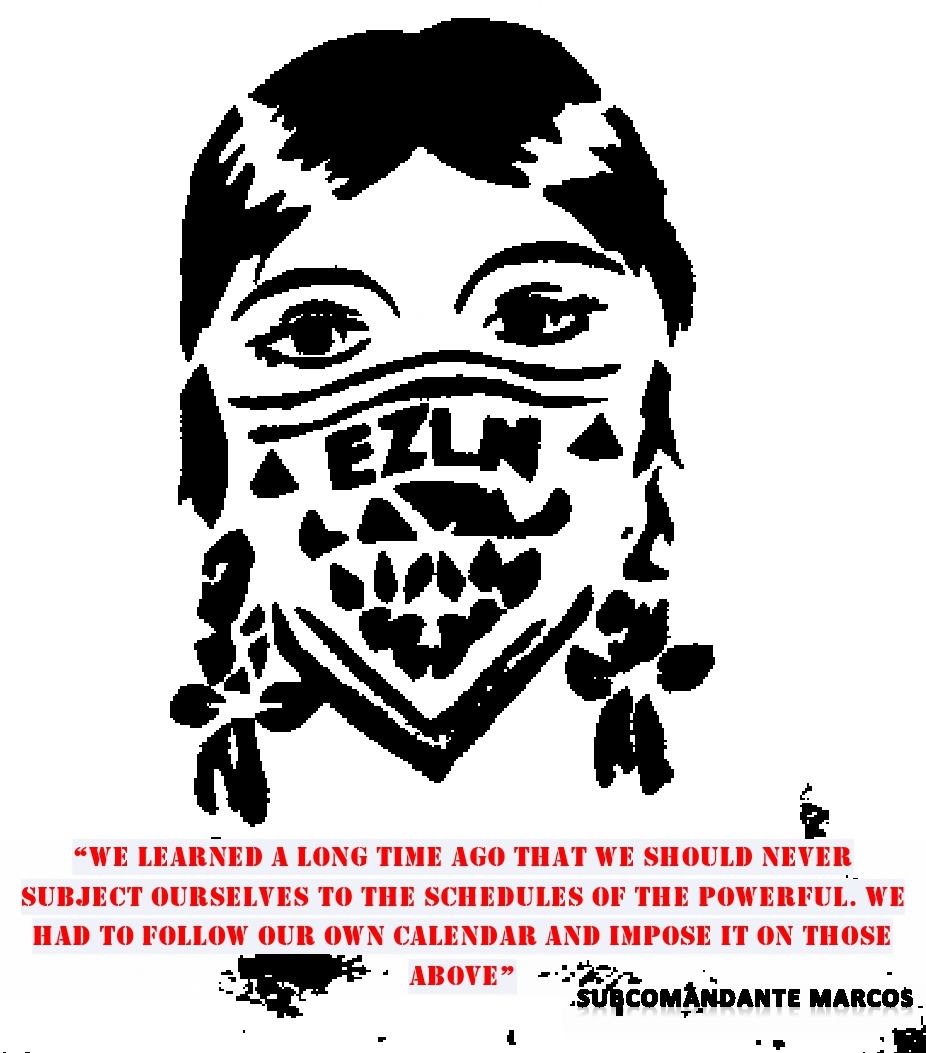The Zapatista Army of National Liberation (Ejército Zapatista de Liberación Nacional, EZLN) often referred to as the Zapatistas is a revolutionary left wing group based in Chiapas, the southernmost state of Mexico.
The group takes its name from Emiliano Zapata, the agrarian reformer and commander of the Liberation Army of the South during the Mexican Revolution, and sees itself as his ideological heir. In reference to inspirational figures, in nearly all EZLN villages exist murals accompanying images of Zapata, Che Guevara, and Subcomandante Marcos.
Although the ideology of the EZLN is reflective of libertarian socialist politics, paralleling both anarchist and libertarian Marxist thought in many respects, the EZLN has rejected and defied political classification; retaining its distinctiveness due in part to the importance of indigenous Mayan beliefs in Zapatismo thought. The EZLN aligns itself with the wider alter-globalization, anti-neoliberal social movement, seeking indigenous control over their local resources, especially land.
The EZLN opposes economic globalization, arguing that it severely and negatively affects the peasant way of life of its indigenous support base and oppressed people worldwide. An example of neo-liberal policy that the EZLN opposes is the North American Free Trade Agreement (NAFTA). Apart from opening the Mexican market to cheap mass-produced US agricultural products, NAFTA spells an end to Mexican crop subsidies without a corresponding end to US ones, and drastically reduced the income and living standards of many southern Mexican farmers who cannot compete with the subsidized, artificially fertilized, mechanically harvested and genetically modified imports from the United States. The signing of NAFTA also resulted in the removal of Article 27 Section VII in the Mexican Constitution which previously had guaranteed land reparations to indigenous groups throughout Mexico.
Another key element of the Zapatista ideology is their aspiration to do politics in a new, participatory way, from the “bottom-up” instead of “top-down.” The Zapatistas consider the contemporary political system of Mexico inherently flawed due to what they consider its purely representative nature and obvious disconnection from the people and their needs. Instead, the EZLN claims to reinforce the idea of participatory democracy or radical democracy by limiting public servants’ terms to only two weeks, not using visible organization leaders, and constantly referring to the people they are governing for major decisions, strategies and conceptual visions. As Marcos has reiterated, “my real commander is the people”. In accordance with this principle, the Zapatistas are not a political party: they do not seek office throughout the state, because that would perpetuate the political system by attempting to gain power within its ranks. Instead, they wish to reconceptualize the entire system.
In an unusual move for any revolutionary organization, documents released by the EZLN (in Spanish) before the initial uprising in 1994 explicitly defined a right of the people to resist any unjust actions of the EZLN. They also defined a right of the people to:
demand that the revolutionary armed forces not intervene in matters of civil order or the disposition of capital relating to agriculture, commerce, finances, and industry, as these are the exclusive domain of the civil authorities, elected freely and democratically.
It added that the people should “acquire and possess arms to defend their persons, families and property, according to the laws of disposition of capital of farms, commerce, finance and industry, against the armed attacks committed by the revolutionary forces or those of the government.”
Read more about the Zapatistas activities http://enlacezapatista.ezln.org.mx/
Gata Malandra
Latest posts by Gata Malandra (see all)
- Event: World Crew Battle UK By Swatch — October 11, 2017
- Knowledge Session: Who Was Manco Inca? — May 4, 2017
- Video + Letra: Illmani ‘Saber es Poder’ — February 3, 2017

